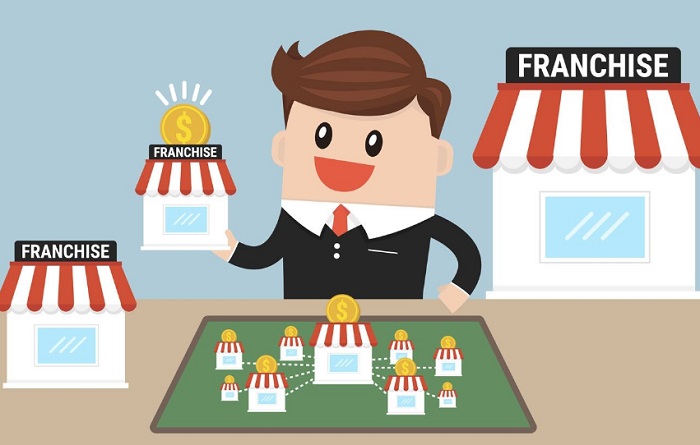In the United States, the overall franchise market is predicted to expand by 2.8% in 2020, creating over Two lacs new jobs for a maximum of 8.67 million workers, based on a forecast by the International Franchise Association. The forecast has been slightly modified by Covid-19 even as the franchise industry continues to grow. Despite the health problem, numerous franchise companies are thriving and expanding. It will further increase the importance and benefits of franchising in the years to come.
Capital, rapid expansion, committed leadership, management, and reduced risk are the main benefits for most businesses entering the franchise market, and there are others, too, though.
9 Importance of Franchising are Discussed Below
Capital
It is of utmost importance to the franchise. The inability to access financing is the main obstacle to growth faced by small firms. Entrepreneurs frequently discovered that their expansion aspirations exceeded their capacity to finance them ever since the credit-tightening during 2008–2009 and the “new normal” that followed.
Franchising has some benefits as an alternative method of capital investment. The main reason why most business owners choose franchising is that it enables them to grow without taking on debt or paying for equity. First, it enables businesses to expand by utilizing others capitals because the franchisee contributes all the funding necessary to build and run a unit. Using other people’s assets, the franchisor can expand largely debt-free.
Rapidity of Growth
Every business person who has created something genuinely new faces the same terrible nightmare: that another individual will outsell them through their idea. And a lot of the time, these worries are justified.
The issue is that it requires time to launch a single entity. The importance of franchising lies here. Given that the franchisee handles most of these duties, for some business owners, franchising could be the only method to guarantee that they seize a market-leading position before rivals infringe on their territory. The franchisor can leverage its human resources in addition to its financial power through franchising. By franchising, enterprises could compete with far bigger rivals and saturate marketplaces before these rivals can react.
See Also: What are the 8Ps of Marketing? The 101 Guide
Employment Leverage
Franchising enables franchisors to run their businesses efficiently with considerably fewer staff. This is another importance of franchising. Franchisers can use these initiatives to cut total employment since franchisees would take on many duties that the corporate cabinet office would typically handle.
Simpleness of Supervision
There are additional benefits and importance of franchising from just a managerial perspective. For starters, the operator is not really in charge of overseeing each franchise unit’s daily operations. On a smaller scale, this implies that when a crew member or shift supervisor calls in ill in the late hours of midnight, they notify your franchisee rather than you.
Additionally, the franchisee seems to be in charge of finding a substitute or covering their shift. And it won’t affect your operating income if they decide to pay prices that aren’t competitive with the industry, hire their friends and family, or squander money on pointless or wasteful goods. Franchising enables you to focus your resources on enhancing the overall situation by removing these duties.
Higher Profitability
Franchise businesses can operate very profitably thanks to the staffing leverage plus the simplicity of monitoring discussed above. The franchisor’s organization is typically even leaner (and frequently draws on the organization that is now in place to promote company activities) because the franchisor can rely on its franchisees to handle the choice of location, licensing scheme, marketing communications, employing, mentoring, auditing, payroll, as well as other people management functions (to name a few). The end effect is that a franchise business can become more successful.
Unfortunately, it is challenging to measure or support this claim. We know that top quartile franchisor contributed an average of 40 to 45.6 % towards the bottom line during 2001 and 2002, respectively, according to research conducted over the preceding 10 years.
Increased Values
Higher yields, stronger profitability, and greater organizational leverage are some of the importance of franchising that explains why franchisors are frequently priced at a more significant multiple than most other companies. Therefore, having a scalable development model in place and being a profitable franchisor may provide you with the benefit of franchising when it is a chance to sell your company.
The average price-to-earnings ratio of franchise businesses was 26.5, compared to the typical P/E ratio of the S&P 500, which was 16.7, according to research conducted in 2012 by the iFranchise Company. This represents a startling 59 percent advantage above the S&P. Furthermore, the S&P ratio was surpassed by further than two-thirds of both the entrepreneurs assessed.
Marketshare in the secondary and tertiary sectors
There are several significant ramifications to franchisees’ capacity to enhance unit-level business performance. A typical franchisee could produce more money than a supervisor in a comparable area can, in addition to keeping a closer check on expenses.
Furthermore, even after taking into account the profits she should pay you, the franchisee frequently operates a unit better profitably because she is probably going to have a different pricing structure compared to you as both the franchisor (he might pay lesser salaries, may not offer the very same benefits packages, etc.).
Effective Management
Finding and keeping competent unit supervisors is another challenge that many business owners who want to grow must overcome. It happens all too frequently for a company owner to invest months in finding and directing new management only to have them leave or, even worse, get recruited away by a rival.
Additionally, hired managers are the only workers that may or may not honestly care about their work, making it difficult to supervise their efforts remotely.
The following elements working together will improve unit-level productivity in various ways.
Long-term dedication
Given one’s financial commitment, the franchisee will find it challenging to close down his enterprise.
A higher standard of management
As a long-term “manager,” your franchisee will keep learning about the industry and is much more likely to acquire relevant information about your company that will help him operate more effectively as he devotes years to the enterprise.
An increase in operational quality
Franchise owners often take ownership confidence very seriously, even though no detailed studies precisely quantify this variable. Because they own the company rather than just managing it, they will maintain cleaner working environments and provide more excellent staff training.
Innovation
Franchisees are constantly seeking ways to enhance their firm since they are interested in its success, which is a quality most managers lack.
Franchisees usually outmanage managers
Additionally, franchisees will pay closer attention to the expenditure side of the equation, including labor costs, fraud, and any additional line items that can be cut.
Franchisees frequently perform better than managers
Franchisees will do better than managers in terms of generating money. This quality improvement may be substantial; it frequently ranges between 10% and 30%.
Lessened Risk
Franchising also lowers exposure for the franchisor because of its nature.
Unless you decide to construct it differently (which few want), the franchisee is entirely responsible for the invested capital in the franchising business, including paying for any build-out, buying any stock, hiring any workers, and accepting responsibility for any capital investment required to start the business.
Ways To Start A Franchise
If you want to start a franchise, the following steps can help in reaching your goal.
To discover the best fit, research franchises and costs.
To determine which franchise opportunities will offer you the best return on your investment and the opportunity for a consistent income stream, conduct a thorough analysis of your options.
When deciding on a franchise, financing is necessary. You must ensure that franchising is a financially viable endeavor because it’s leasing a business.
When assessing possible franchise investments, keep the following things in mind:
- Typical franchise earnings
- Beginning money
- Royalty charges
- Marketing costs and other costs
- Rent amounts
- Fees for franchises
Review the potential of your franchise.
Consider the franchise’s potential after taking franchise costs and deciding if it will yield a positive return on investment. What local rivals, for instance, exist there? Are the people who will buy from you local?
Make sure there are only so many franchises of the leading company close by. Although some brands, like Dunkin’ Donuts or Starbucks, can support many locations, it’s imperative to avoid opening a site that will be too competitive and underperform.
Prepare an enterprise strategy for your franchise.
A business plan is essential to help you acquire a franchise and funding. You will submit your company plan to share your objectives and financial forecasts with investors and others.
Complete all franchise-related paperwork.
The franchisee must make legal and financial arrangements to start the procedure. A franchise licensing contract will be presented for your signature. Before signing the contract and purchasing the franchise, carefully read and comprehend it.
Choosing your legal structure, such as establishing a limited liability corporation, is another crucial decision (LLC). Work with the parent firm during this procedure. Depending on their overall structure, franchisors may require various corporate entities.
Choose a location for your franchise company.
Once you have created and refined your business processes, finding a location for your firm is necessary. Before signing a lease for a piece of property, consider the terms of your agreement, as your franchisor may have specifications for the required space.
Ensure your placement is not too close to a building controlled by the franchisor or another franchisee.
Employ personnel for your franchise.
Employer selection is the following stage. Your franchisor might offer resources and training programs and help you with hiring. The franchisor can assist you in finding staff by providing resources like an intranet system from the parent firm or thorough job descriptions.
Schedule the debut of your franchise.
Planning your opening day is now necessary with everything in place. Participate in social media marketing, local press outreach, and marketing-related services by asking your franchisor for advice. For in-store events, check your franchise agreement to determine what is permitted. Make an effect on the community that will stick.
Your route to business owners may be through franchising.
It’s challenging to create a path for a new company, and however, starting a franchise combines the advantages of entrepreneurship with the financial strength of a sizable parent firm. Any degree of business ownership involves risk, but franchising offers some assistance and can lead to professional fulfillment. Consider engaging legal counsel to direct your route as you conduct a careful franchise search.
FAQs
What is Franchising, and Why is it Significant?
A franchise (also franchising) seems to be a technique of selling goods or services that involves a franchisor who creates the brand's registered trademark with the business model and a franchisee that pays a license and frequently an upfront fee to have the right to use the franchisor's title and systems.
What are the Benefits of Franchises in the Modern World?
People can own, run, and operate their organization through franchising without taking on all the risks involved. Many people who would otherwise not have opened their enterprises could do so because of this feature. An essential part of the American industry is the franchising sector.
What Impact does Franchising have on the Modern Economy?
The IFA reports that the United States employment rates increased by 3.5 percent during 2016. According to the expected totals for 2017, there will be steady growth and the creation of approximately 250,000 new jobs. Franchise output reportedly increased by 5.8% in 2016.
How might Franchising Aid in the Business Expansion?
Franchising provides a substitute that enables business owners to grow without paying for equity. The franchisee contributes the funding required to start and run a unit, enabling the franchisor to expand without taking on debt or sacrificing equity.
What Effects do Franchise Businesses have on the Neighborhood?
Franchise benefits the neighborhood and provides stability and company ownership to their franchisees. Franchises are a win-win situation for everyone concerned, whether in producing jobs or developing symbiotic partnerships with other nearby firms.
Summing Up
One has a significantly lower risk. Thanks to the combination of all the above factors. Franchisors can expand their business to thousands or even hundreds of units without investing much money or using any of their money for unit expansion.
Despite the highs and lows the franchise industry saw in 2019; there remains a strong likelihood that the franchising marketing strategy will continue to achieve significant benefits and earnings.
In entrepreneurship, the importance of franchising has a lot of relevance and value, from starting an internet franchise firm to building a new store!









